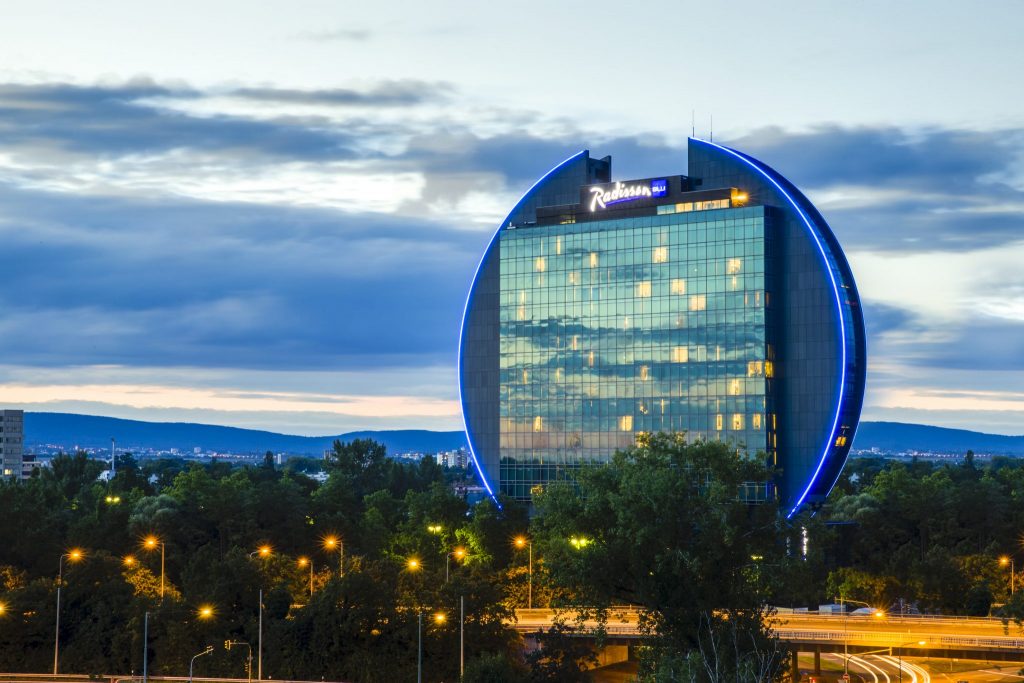Skift Take
Federico Gonzalez argues lifestyle hotels aren’t just for the well-heeled, and rivals are “punishing” guests with poor design. But it may be a challenge to roll out so many properties and keep them feeling unique.
The CEO of Radisson Hotel Group is pursuing lifestyle hotel signings to fuel expansion in Europe, the Middle East and Africa as he lays claim to his group being one of the originators in the category.
The Brussels-headquartered company extended its strategic partnership with hospitality real estate and management company PPHE Hotel Group this week, which will now help it develop more high-end art’otels.
Several are earmarked to open in the coming years, including two in London, in the redeveloped Battersea Power Station and another $300 million building in the capital’s trendy Hoxton district.
PPHE has been a “master franchisee” of Radisson’s upper upscale Park Plaza brand for 20 years, but now the pair plan to capitalize on the growing demand for lifestyle hotels.
Radisson will also expand its two-star lifestyle brand, prizeotel, targeting 45 new signings in the next five years. Overall, the group, which has 100,000 employees, wants to sign 330 hotels this year.
Radisson chief Federico Gonzalez is confident because he thinks competitors have been “punishing” guests with poor design.
“With all respect, lifestyle is becoming the new buzzword for hospitality,” he said. “For many years, you have one hotel that is done centrally, and all the others are the same. I won’t tell you the brands, but they are very big American brands and very big French brands. They had one hotel, and they would replicate that hotel everywhere in the world.”
He claimed many today have “no style.” He also said Radisson Blu was the largest upper, upscale brand in Europe, the Middle East and Africa, compared to the group’s Radisson brand. “Radisson Blu hotels are extremely lifestyle,” he said. “One of the reasons they’re successful is because they have a lot to offer versus the ‘no anything’ hotels from some of our competitors.”
He said prizeotel, which it acquired in 2019, were not all the same. “They each have their own style. We have as a company always had lifestyle in each of the hotels we’ve operated.” Each art’otel, meanwhile, is inspired by a signature artist.
Gonzalez said many airport and business hotels have tended to be “big boxes without any style” for years now. “For a significant amount of hotels it looks like they want to have a lower price (and) they punish you to see things without any kind of taste.”
Economy and lifestyle make strange bedfellows, but he thinks prizeotel’s designer Karim Rashid has nailed it. The designer has previously described the hotels as “ground breaking.” Some 19 hotels are in operation and in the pipeline, with plans to double to that to 45 in the next three to four years.
Adapting to Post-Pandemic Work Patterns
Meanwhile, Gonzalez has played down the ongoing labor shortage, following 100,000 applications so far this year and a new recruitment campaign. Radisson wants to fill 1,500 roles in total. He thinks shortages depend on the country, with the UK about to suffer the most due to a “systemic shortage” as fewer people come to the country. Ryanair CEO Michael O’Leary said earlier this week that staffing issues were a product of the UK’s decision to leave the European Union.
But people were also looking at how the companies behaved during the pandemic, and at what happened with those employees over the past three years — which happens to be the basis of United Airlines’ latest campaign. “We invested in training,” Gonzalez claimed, adding Forbes has rated Radisson the fourth best employer in the travel and leisure category.
“Shortages will continue, so we need to improve the quality of the jobs, the pay, and increase aspiration,” he said. “Hospitality is one of the industries where you can grow the most. Reception, marketing, accounting, food and beverage … there’s a huge amount of potential. Let people progress in their career.”
On the topic of work, Brussels-headquartered Radisson can tick most of the boxes when it comes to how it reacted to the sudden shift in remote trends. It offered hybrid-ready meeting spaces and day-use rooms as offices too. But Gonzalez doesn’t expect more to come, and said he hasn’t seen too much of a shift in so-called bleisure breaks.
It also significantly changed most of its lobbies for people to work in, while its serviced apartments also did well in the pandemic. There’s been a slight growth in booking lengths, but “average numbers are terrible, because it doesn’t mean everybody’s doing the same.”
Further ahead, hotels this summer are being booked out, and there’s still room to keep up on edging up rates in the six months for the remaining ones that still have availability. But he won’t be drawn on predictions beyond the fourth quarter, in particular in case another virus variant appears.
“It’s more guessing that forecasting. We need to be in the car, but the brakes ready in case anything happens,” he said.
UPDATE: An earlier version of this article said the recruitment campaign generated 100,000 applicants, and 1,500 roles had already been filled. The version also stated Radisson was the largest upper, upscale brand in Europe, the Middle East and Africa.
Have a confidential tip for Skift? Get in touch
Tags: business travel, ceo interviews, corporate travel, hospitality, hotels, inflation, labor, lifestyle hotels, radisson
Photo credit: Radisson Hotel Group wants to sign a total of 330 new properties this year. Radisson Hotel Group
